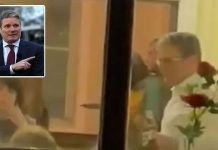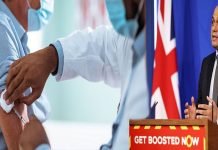The spread of coronavirus in the UK is “likely”, Boris Johnson has said, but a plan has been agreed to tackle it.
Johnson said people “should go about business as usual” at the moment, adding that the UK was “well prepared” and further details would be announced in the coming days and weeks.
Ministers from every government department met in the cabinet office this morning to agree the plan as the number of UK cases hit 40.
Meanwhile, the EU has raised the coronavirus risk level in member states to “moderate to high”.
The four new UK cases had all travelled to Italy, which has seen the largest outbreak in Europe, England’s Chief Medical Officer Professor Chris Whitty said.
They are from Hertfordshire, Devon and Kent and tracing their contacts has begun.
It’s understood the action plan will include primary legislation, which will have to be passed by MPs and peers in an act of Parliament.
The first elements are expected to appear next week, but it could take until the end of March to be fully in place. A government source said: “You are talking about months rather than weeks before we reach the peak of this.”
The emergency legislation is understood to cover “all eventualities” – including both the delay and mitigation phases of the virus.
The Prime Minister’s official spokesman said: “The UK wide action plan in response to Coronavirus was agreed and that will be published tomorrow.”
It was “agreed by all four parts of the UK” – including Nicola Sturgeon and Wales’ Mark Drakeford – and they “will be working closely together on ensuring we have the best possible response for dealing with the outbreak.”
He added: “There will be further and extensive public information campaigns in the coming days and weeks”.
The PM’s spokesman indicated the option of sealing off cities entirely was still on the table.
He said: “We will be guided by the evidence and the latest advice from medical experts.
“As the Health Secretary said yesterday the top priority is to keep the public safe while mitigating the economic and social consequences. We will take all reasonable steps, driven by the science.”
No10 did not rule out a role for the military, saying the government will take “whatever responsible steps are required that will be helpful.”
Earlier, Public Health England (PHE) said widespread transmission of coronavirus in the UK was now “highly likely”.
Medical Director Prof Paul Cosford said the increase in cases in the UK and abroad meant the UK must be prepared.
If the outbreak worsens, the government has said measures could include asking newly-retired doctors and nurses to return to the NHS.
People could also be urged to work from home – and closing schools and cancelling major public events have also not been ruled out.
Asked if members of the public should wear face masks Boris Johnson’s spokesman said: “The advice is very firmly focused on the importance of washing hands regularly.”
He said “further action” will be taken “if needed” to protect low wage or zero hour workers – but did not confirm whether this will involve widening Statutory Sick Pay.
Number 10 signalled the Budget – which will go ahead next Wednesday – may include emergency Coronavirus funds.
The PM’s spokesman said: “The government stands ready to use all the levers at its disposal to ensure we are as prepared as we can be.”
Number 10 said Mr Johnson is personally washing his hands regularly with hot, soapy water for 20 seconds.
Matt Hancock declared ‘UK could shut down cities to control coronavirus outbreak ‘

Hancock the Secretary of State for Health and Social Care was asked by BBC’s Andrew Marr whether the UK could follow the example of Chinese authorities, who isolated the entire city of Wuhan to control the spread of the virus.
Mr Hancock responded: “There’s clearly a huge economic and social downside to that.
“But we don’t take anything off the table at this stage, because you’ve got to make sure that you have all the tools available, if that is what’s necessary.
“But I want to minimise the social and economic disruption.”
He also confirmed that the NHS would fast-track the re-registration of retired doctors to deal with staff shortages if the virus becomes widespread.
The move is part of the COVID-19 “battle plan” announced by the Government on Sunday morning.
Other confirmed measures include relaxing restrictions on school class sizes and discouraging non-essential travel.
The Health Secretary said further “population distancing measures” could include banning public gatherings of more than 5,000 people as the French government has announced.
A full set of measures for a worst case-scenario pandemic are set to be published by ministers later this week.
Mr Hancock meanwhile defended Boris Johnson amid claims he has been slow to chair a meeting of the Government’s Cobra crisis committee.
Labour has branded the Tory leader a “part-time” Prime Minister after waiting some 72-hours between announcing a meeting of the top set of officials and ministers and holding it on Monday.
Shadow Health Secretary Jonathan Ashworth said: “There are growing concerns about our part-time Prime Minister’s handling of the Coronavirus outbreak and serious questions about capacity in our overstretched NHS.
“The Health Secretary should come to the Commons on Monday to explain fully the emergency powers he is planning to bring in, and to update MPs on the government’s response so that we can properly scrutinise it.”
But Mr Hancock told Sky’s Sophy Ridge: “The Prime Minister has been all over this. I have daily calls with him often more than once a day. And I’ve been updating cabinet weekly.
“I’ve been chairing those Cobra meetings across government – a case of ministers and officials working incredibly well together.
“And the prime minister is fully on top of all of this, and that’s the way it should be.”
Over 10,000 people have been tested in the UK for COVID-19, with only 23 positive cases confirmed so far.
How can I protect myself?
Coronaviruses are passed on by droplet infection, the virus multiplies in the throat. From there the pathogens can be expelled from the body faster than from the lungs, for example by sneezing, coughing or blowing. In this way SARS-CoV-2 spreads onto surfaces where it comes into contact with mucous membranes and infects others by smear infection via the hands.
What concrete measures can individuals undertake to protect themselves and others from a droplet infection?
- Keep a distance of one to two meters from anyone who is infected.
- Wash your hands regularly and carefully (at least 20 seconds with soap, including the wrists).
- Avoid shaking hands and hugging people
- Develop self-protection reflexes: Press elevator buttons with your knuckle instead of your fingertip.
- Avoid busy places and events. Set priorities.
- Avoid touching your own face or the faces of friends and relatives.
- Do not touch the mucous membranes of your mouth, eyes and nose with your fingers.
- Put on gloves if necessary. Wash or change them daily.
- Do not sneeze in your hand. Use your elbow or a tissue instead.
- Dispose of used tissues quickly.
Breathing masks offer little protection to healthy people. When worn, the masks become moist through air intake. After just 20 minutes their protective barrier deteriorates. Masks should be reserved for medical staff.
How can I prepare for a pandemic?
If it comes to an intense wave of infections, restrictions on movement will most likely be imposed and this could lead to supply bottlenecks. Take precautions so that you can stay at home for several weeks if necessary.
- Have important prescription medication (if necessary) ready for a month.
- Keep a supply of non-perishable food.
- Make arrangements for how to protect your friends and family. The elderly and sick with weak immune systems are particularly at risk and dependent on help.
- Organize possibilities for caring for sick children.
- Make arrangements for caring for sick family members without infecting yourself.
How can I help the community?
The more people make efforts to prepare, the more the feeling of togetherness increases. You can improve the situation by helping communities to organize help for themselves.
After surviving the COVID-19 disease you are immune to the pathogen. Therefore, you can leave your home and volunteer to take over other errands and do some shopping for those who are still sick and infectious.
Support Independent Journalism Today
Our unwavering dedication is to provide you with unbiased news, diverse perspectives, and insightful opinions. We're on a mission to ensure that those in positions of power are held accountable for their actions, but we can't do it alone. Labour Heartlands is primarily funded by me, Paul Knaggs, and by the generous contributions of readers like you. Your donations keep us going and help us uphold the principles of independent journalism. Join us in our quest for truth, transparency, and accountability – donate today and be a part of our mission!
Like everyone else, we're facing challenges, and we need your help to stay online and continue providing crucial journalism. Every contribution, no matter how small, goes a long way in helping us thrive. By becoming one of our donors, you become a vital part of our mission to uncover the truth and uphold the values of democracy.
While we maintain our independence from political affiliations, we stand united against corruption, injustice, and the erosion of free speech, truth, and democracy. We believe in the power of accurate information in a democracy, and we consider facts non-negotiable.
Your support, no matter the amount, can make a significant impact. Together, we can make a difference and continue our journey toward a more informed and just society.
Thank you for supporting Labour Heartlands












